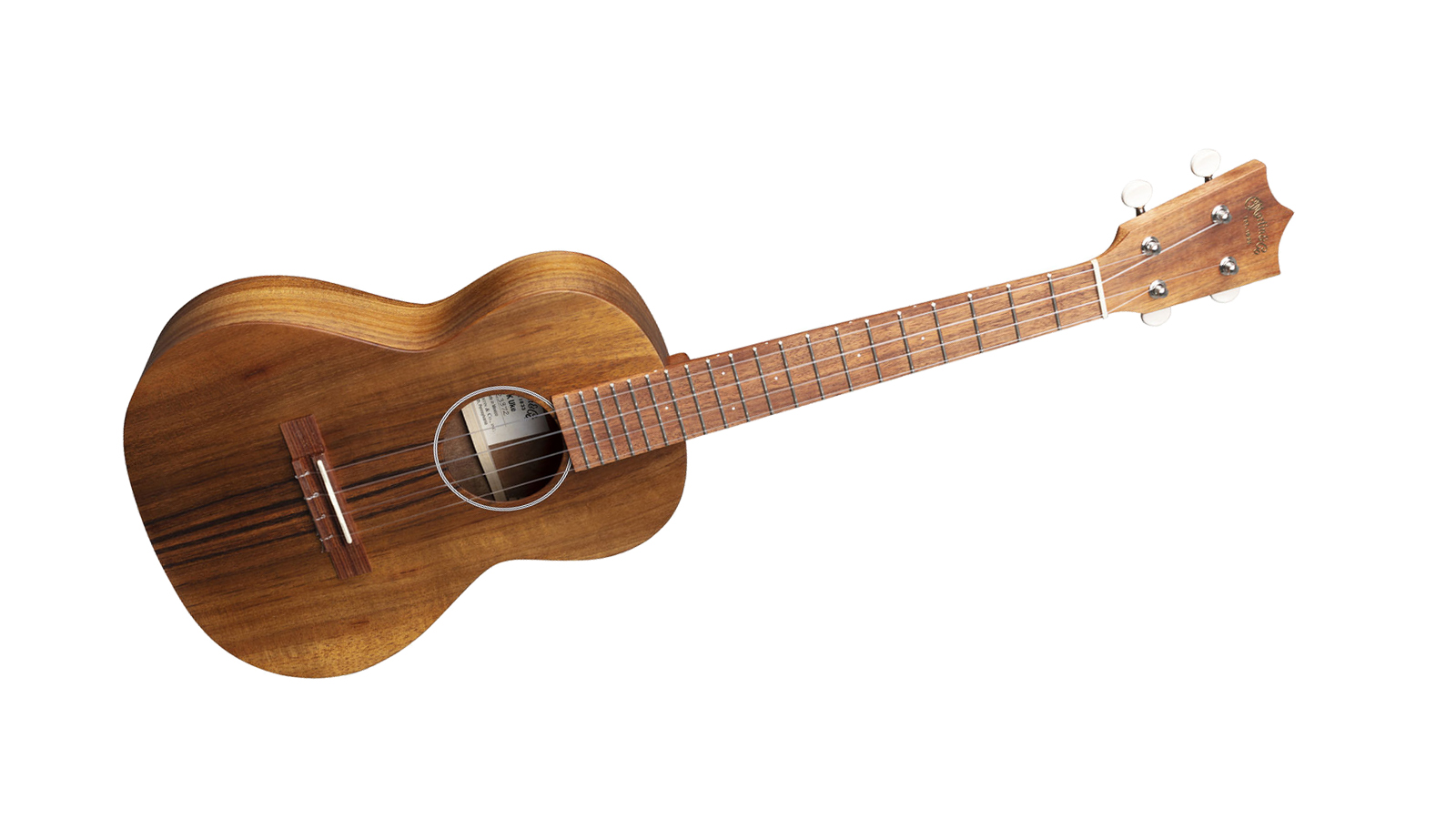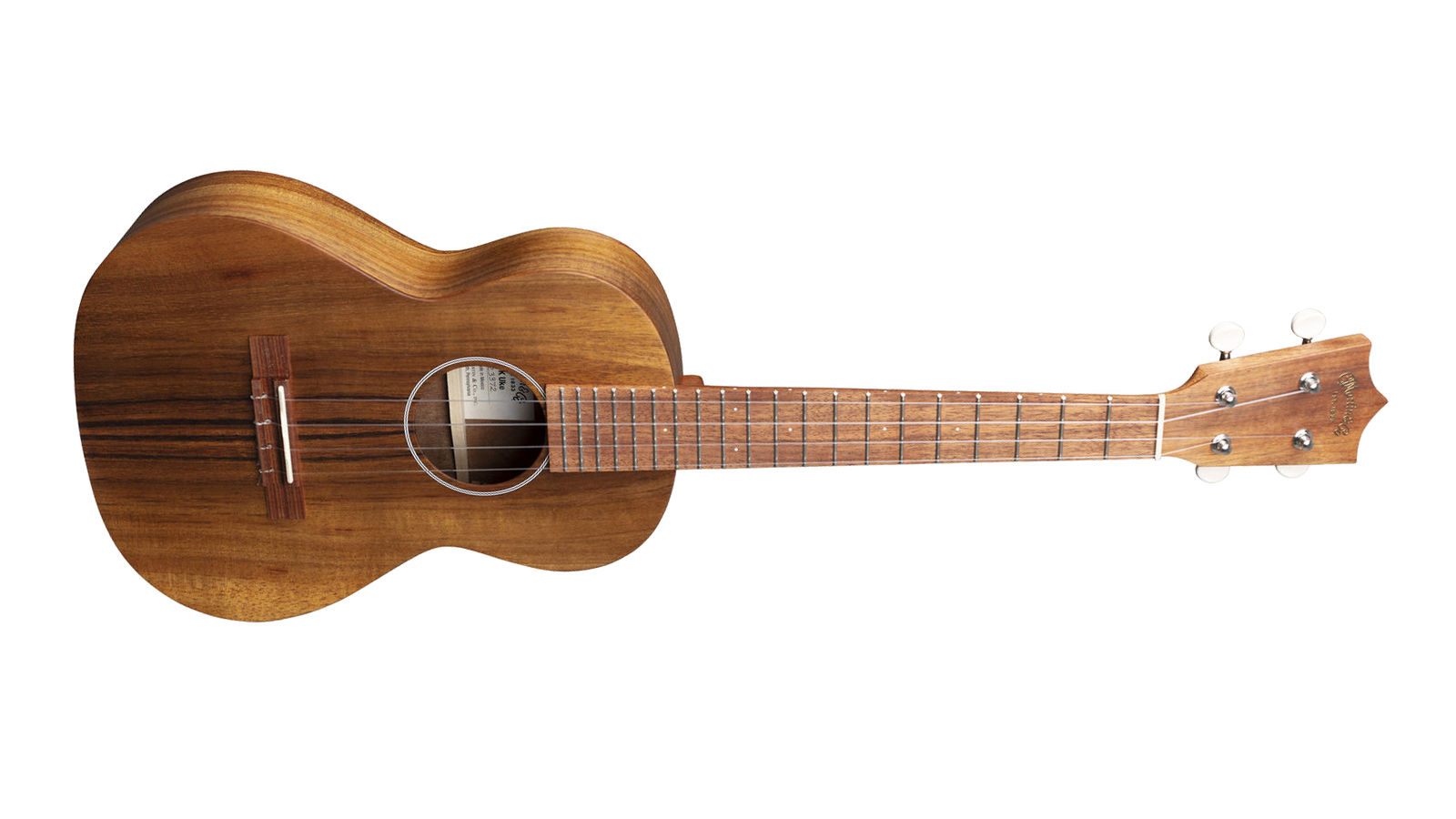MusicRadar Verdict
The T1K is a gorgeous little instrument that's a treat for the pocket as well as the ears and the eyes.
Pros
- +
Sweet tone
- +
Powerful projection
- +
Beautiful solid koa construction
- +
Flawless build quality
- +
Classy looks
- +
Excellent value
Cons
- -
Want bling? Look elsewhere…
MusicRadar's got your back
Martin T1K Ukulele review: What is it?
The T1K is Martin's mid-range, solid Koa tenor ukulele. Didn't know Martin makes ukes? Well, although for most of us the Martin brand name conjures up images of iconic, fine-quality, steel-strung acoustic guitars like the D28, it’s actually been making ukuleles for more than 100 years. So popular were its early models that by 1926, just over a decade since bringing its first uke to market, it had sold almost twice as many ukuleles as its entire production of guitars since 1833. Back then it couldn't make enough of them.
Ever since, ukulele production numbers have waxed and waned more times than the twin moons of Mars, but the past decade has been good for Martin ukes. For the first time in years, Martin has about a dozen ukuleles in its range, starting with the $299 laminate OXK and topping out in style with the magnificent, blingtastic $4,499 5K.
The Mexican made T1K sits towards the lower end of Martin's portfolio but make no mistake, this is a mid-range uke in both price and performance.
First off, the T in its name is Martin's way of letting us know that this is a tenor ukulele. Tenors are quite a bit larger than soprano ukes (the most common variety) and a touch bigger than concert models. The increased length, deeper body and wider bout promises more volume, more mid-range, increased bass and a longer neck to comfortably play fingerstyle on. Counter-intuitively, despite the tenor moniker, tuning remains exactly the same for all three variants, so none of the three are higher or lower pitched, they just feel and sound different.
Martin has always labelled its ukes from 0 to 5, with 0 being the entry-level model and 5 boasting the finest woods and accoutrements. The T1K may be a 1, with its relatively modest price and unassuming looks but it's also built from koa (hence the K), so it's hardly a plain Jane.
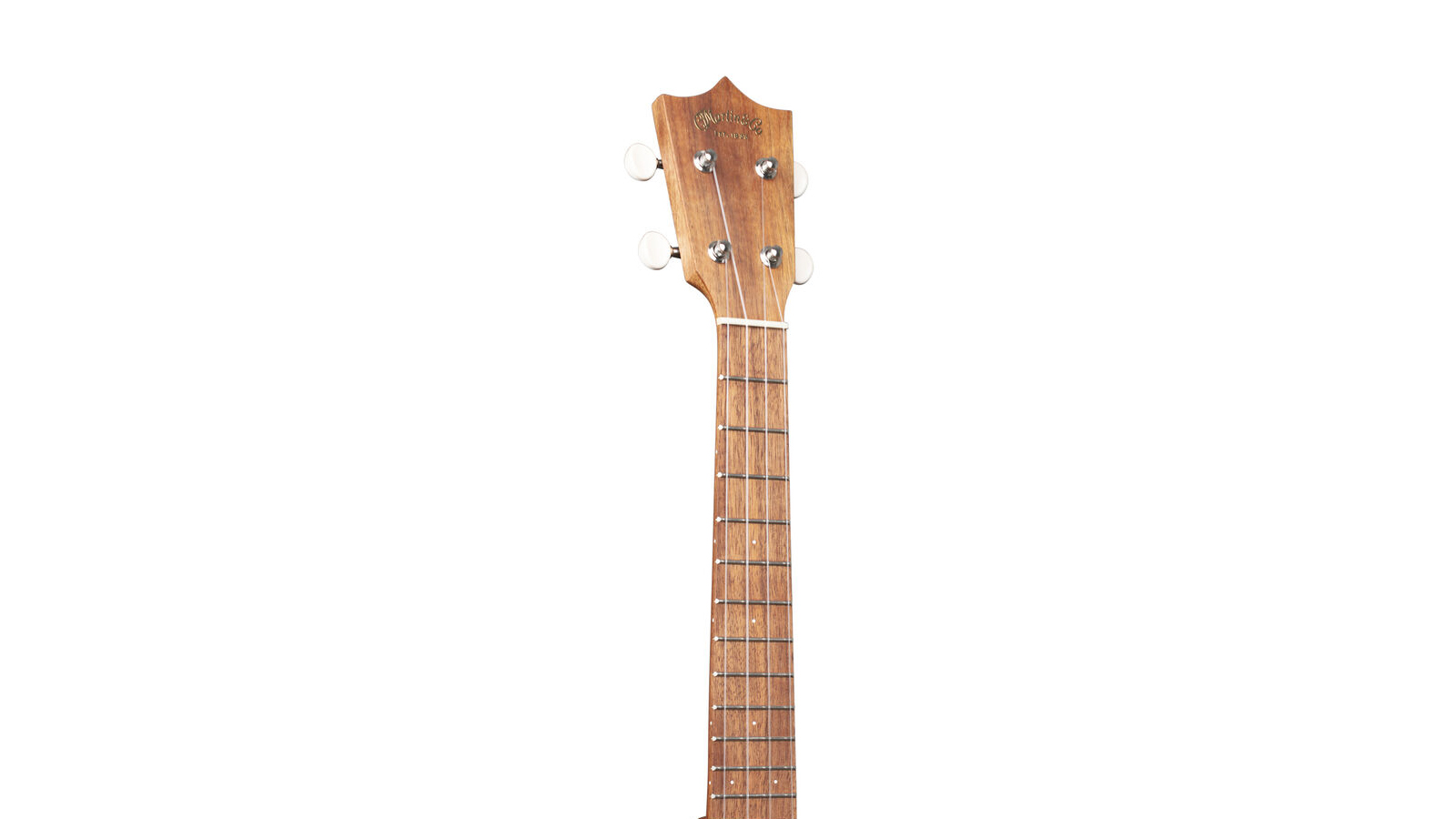
The top, back and sides are all solid koa, the bridge and fingerboard are sipo, which is an African hardwood with similar qualities to mahogany, and the neck is an undefined 'select hardwood'. The non-scalloped bracing is Sitka spruce.
In common with many of its ukuleles, Martin has specced attractive nickel open-gear machine heads with cute faux-ivory button knobs, which give the T1K a suitably retro feel. It also ships with a smart TKL padded gigbag.
Martin T1K Ukulele review: Performance & verdict
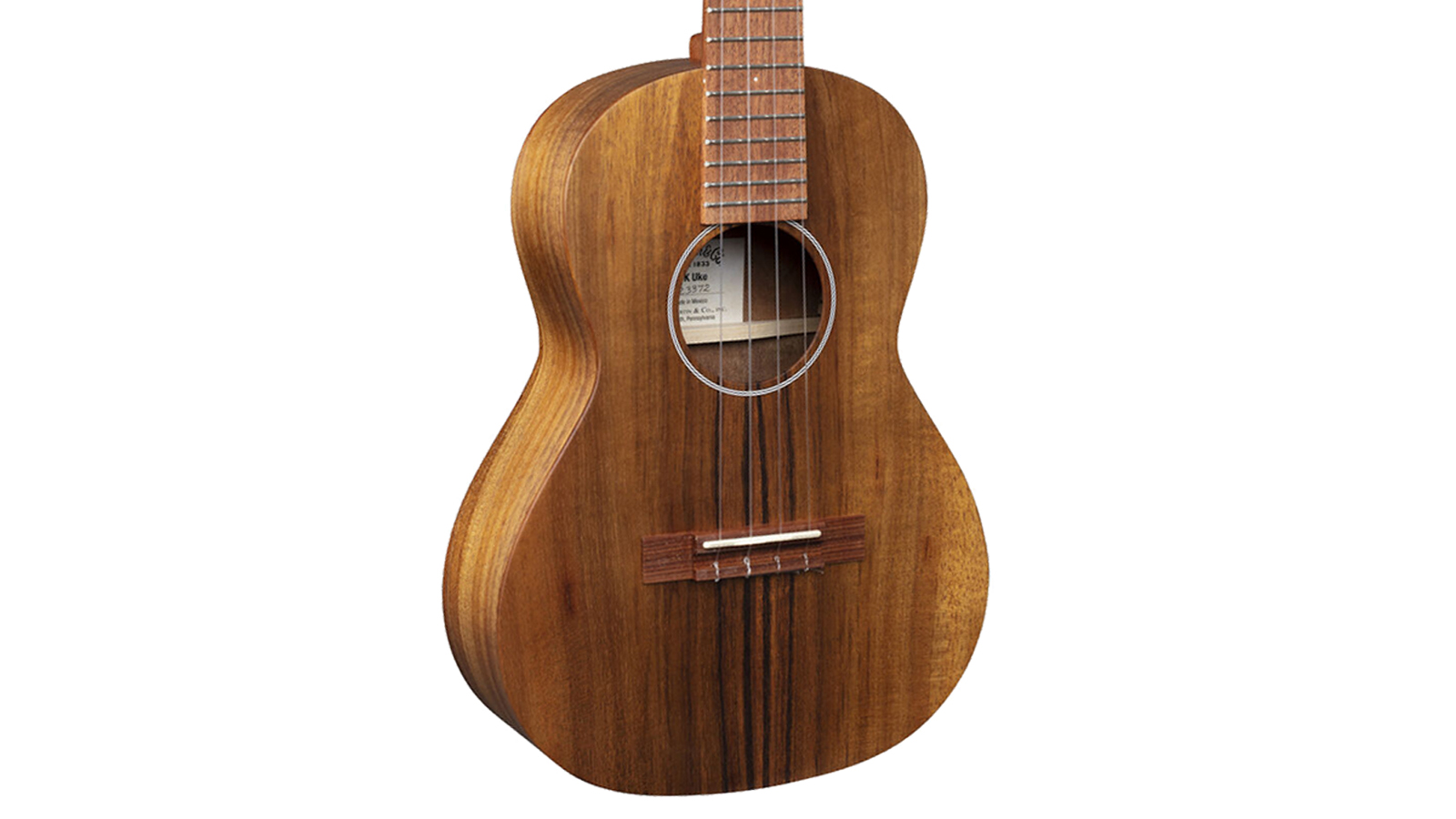
As we've already hinted, the T1K looks fantastic. This may be a lower-grade uke in Martin's eyes, but for the rest of us it's very striking, even if the aesthetic is rather minimalistic.
There's nothing in the way of bling here. The rosette is a simple, white multi-stripe affair, and the fingerboard markers are minute dots of white plastic. There's no binding, either on the fretboard or the body. Purfling? Abalone inlays? Chance would be a fine thing.
What rescues the T1K from looking blander than unseasoned tofu is, of course, the koa. Admittedly, some examples of koa can be pale, straight-grained and somewhat uninteresting, but on our sample Martin has cleverly sourced some richly-coloured lumber with plenty of interest. Our top is a deep, cinnamon brown; beautifully figured in some places with curly detail in others. The sides are also gorgeously figured, and the back is similarly ornate. This is one handsome uke.
The 'select hardwood' neck and sipo fingerboard are less remarkable in appearance, simply because it's hard to compete with a decent piece of koa. Still, Martin has used some quality, straight-grained timber here too, with no knots or blemishes and zero sign of filler.
The entire instrument is finished in a very finely applied satin lacquer that's so thin you can feel the grain beneath your fingertips as you run them across the soundboard. It's attractive, tactile, but more importantly it liberates the body to vibrate and resonate freely for better projection and tone.
Our T1K is flawlessly built, with no sign of gaps, glue or sharp fret ends. It's an absolute pleasure to handle. Out of the box, guitarists used to an acoustic steel string may find the action a little high, but this is a nylon stringed instrument, so its par for the course. Consequently, there's zero fret buzz and it's very playable, even if it takes a few minutes to get used to. Out of the box, intonation at the 12th fret was faultless.
Some years ago, Martin settled on a comparatively narrow 1 11/32 inch nut width for its tenor ukuleles, with competitors' models typically a millimetre or two wider. Some players, regardless of hand and finger size, are acutely sensitive to neck sizes and string spacing while others are comfortable noodling away on anything with four strings and a captive audience. We didn't find it particularly cramped, but your mileage may vary.
What we did re-discover is that a tenor ukulele is a blast to play. The larger body size and 17 inch scale length makes the T1K a versatile instrument, and it's not often we say that about a ukulele.
Unless you're incredibly agile, tiny soprano ukuleles with their diddy fretboards are limited to early position rhythmic strumming and little else, but this Martin just cries out for melodic musical adventures to be explored further along its neck, all 20 frets of it. Admittedly, real estate gets a little bijou after the neck joins the body at the 14th fret but before that it's great fun playing fingerstyle arpeggios, scales, runs and riffs with gusto.
To ram the point home, this is a ukulele you can actually play rather than just strum. If strumming is your thing then knock yourself out, you can do that too.
So, what does it sound like? If you're used to the plinky, staccato tones of a cheap soprano uke then the T1K is going to be a revelation. Strum an open C chord (fret the first string at the third fret) and hear those open strings ring out. The first thing you'll notice is the volume, this thing is loud. The second thing is the sustain. Small, cheap ukes have a sharp attack and then nothing, they're pretty gutless. The T1K will ring and ring, which is usually a good thing unless you're specifically looking for an uke with a short decay to fit with other instruments in an ensemble.
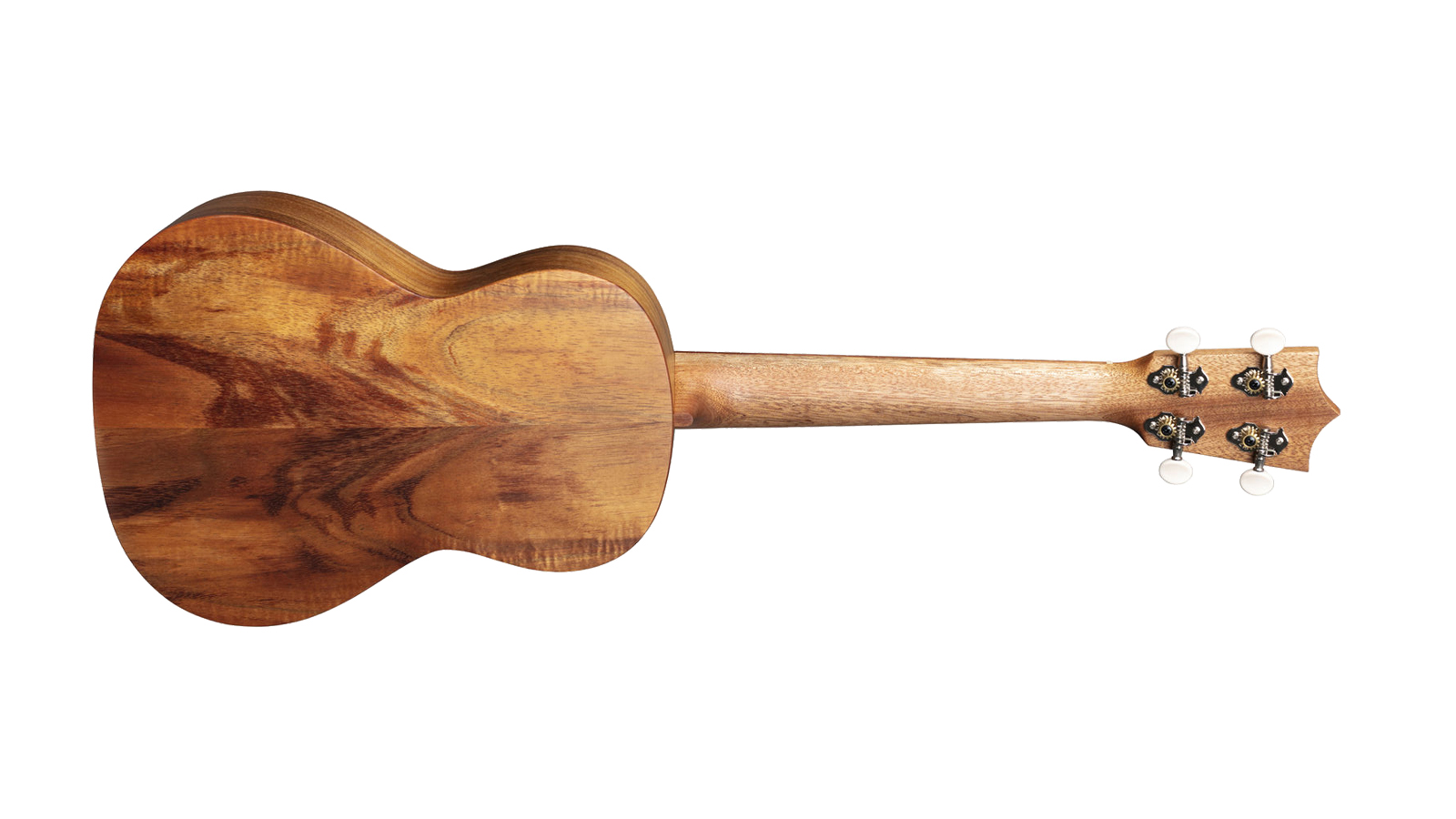
This is a very sweet sounding, beautifully balanced instrument. There's a clarity in the trebles, but also a fatness. The midrange is punchy, pronounced and the bass full, mellow but far from flabby. Overtones are present, pleasant but well-controlled. In short, it nails the ukulele sound we're all so familiar with, but then keeps on giving.
OK, so a big part of its tone is a characteristic of its larger size – any tenor uke should sound louder and rounder than a soprano. But, in this case, Martin must take some credit for building a light, resonant ukulele from first-rate tonewoods that sounds just lovely. In fact koa, which can initially be a bit bright, should warm up after a few years, rewarding players with better tone every time they grab their T1Ks and play.
It's hard not to recommend the T1K to newbies and experienced players alike. For a beginner uke, there's no getting away from the fact that it's four times the price of many entry-level instruments. However, it's easily four times better value than some plinky-plonky plastic toy that'll probably be discarded after a few weeks. This one's a keeper.
For experienced players who are considering spending a lot more, stop for a minute and ponder what the extra cash is buying you. Better tone or better bling? If you need intricate rosettes, mother-of-pearl inlays and a luthier's signature in your life then the T1K isn't for you. If you're after great tone in a subtle looking package that doesn't require you to hawk a kidney on eBay then hello, meet your new best friend, the T1K.
Martin T1K Ukulele review: Hands on demos
GotAUkulele
Peter Forrest
Ukulele
Martin T1K Ukulele review: Specifications
- Size: Tenor
- Top, back and sides: Koa
- Neck: Select hardwood
- Fretboard: Sipo
- Finish: Hand-rubbed satin lacquer
- Scale length: 17 inches
- Total number of frets: 20
- Tuning machines: Nickel Open Gear
- Case included: Soft Gig Bag
- Contact: Martin
When Simon's childhood classical guitar teacher boasted he 'enjoyed a challenge', the poor man had no idea how much he'd underestimated the scale of the task ahead. Despite Simon's lack of talent, the experience did spark a lifelong passion for music. His classical guitar was discarded for an electric, then a room full of electrics before Simon discovered the joys of keys. Against all odds, Simon somehow managed to blag a career as a fashion journalist, but he's now more suitably employed writing for MusicRadar and Guitar World. When not writing or playing, he can be found terrifying himself on his mountain bike.
“Excels at unique modulated timbres, atonal drones and microtonal sequences that reinvent themselves each time you dare to touch the synth”: Soma Laboratories Lyra-4 review
“I used everything I knew about music”: How Green Day exceeded expectations with their most ambitious song
YouTube just added AI tools that makes musicians, library music and video editors redundant
